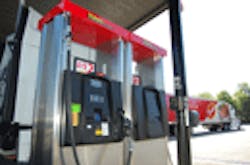Fleets are not going to get much help trying to figure out where diesel fuel prices might end up over the summer months, as conflicting economic data and still-heightened concerns over the unrest in Libya contributes to unpredictable fluctuations in the cost of oil.
For example, oil prices experienced a series of wild swings last week based on a host of factors totally unrelated to traditional supply-and-demand economics. First, the death of Osama Bin Laden at the hands of a U.S. Navy SEAL team pushed oil prices down 2%. Then they quickly recovered by some 3% before falling 15% – with Brent crude reaching $94.60 per barrel by Friday – due to a jump in unemployment figures from the Department of Labor.
Now, however, oil prices are back up over $102 per barrel based on positive export figures from Germany for the month of March and continuing fears over how the ongoing civil war in Libya could affect oil supplies to Europe.
These swings, coupled with sustained prices of over $100 per barrel for oil, are generating more worry about fuel costs among fleet managers.
According to a recent survey by GE Capital Fleet Services, more than a quarter of the corporate fleet managers polled (29%) said the volatility of fuel prices is now their top concern for 2011, up from 12% a year ago.
The survey of 105 fleet managers, conducted recently at the 2011 NAFA Institute & Expo in Charlotte, NC, also found that 64% of them indicated that their main focus going forward is to generate cost savings for their operations, up from 48% in 2010.
“Volatile fuel prices are an overriding concern today for corporate fleet managers, given the current environment,” said Clarence Nunn, CEO of GE Capital Fleet Services. “Thus we are seeing a corresponding increase in interest from our fleet customers for solutions in fuel, telematics and maintenance programs that will help them combat rising fuel costs and improve operational efficiency.”
“It’s creating a ‘double whammy’ among for-hire fleets, as fuel surcharges lag the prices of fuel, meaning carriers must pay more out of pocket and up front for their fuel,” Kenny Vieth, president and senior analyst with ACT Research Co., told Fleet Owner.
“Five months ago or so, oil prices ranged between $70 and $80 per barrel. Now they are swinging from $102 to $118 per barrel,” he noted. “That’s leading to higher fuel prices but also to worries that consumer spending may be reduced as more household funds are diverted to pay for higher gasoline prices.”
As of Monday, the average cost of diesel fuel in the U.S. topped $4.10 per gallon, down 2/10th of a penny from last week, while the average price of gasoline jumped to over $3.96 per gallon on average across the nation, according to the Energy Information Administration (EIA). The agency noted those prices are 97 cents and $1.06 per gallon higher, respectively, compared to the same period in 2010.
EIA expects regular-grade gasoline retail prices, which averaged $2.76 per gallon in the summer of 2010, will average $3.86 per gallon during 2011, with the average price for regular retail gasoline peaking this year at $3.91 per gallon. Diesel fuel prices, which averaged $2.98 per gallon last summer, are projected to average $4.09 this summer, the agency noted.
As a result, the projected increase in gasoline prices suggests that vehicle fueling costs for the average U.S. household will be about $825 higher in 2011 than they were in 2010, EIA said.
About the Author
Sean Kilcarr
Editor in Chief
Sean Kilcarr is a former longtime FleetOwner senior editor who wrote for the publication from 2000 to 2018. He served as editor-in-chief from 2017 to 2018.
